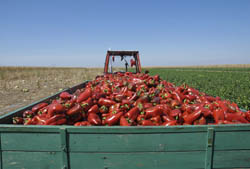Balkan agriculture goes high-tech
Agriculture can benefit greatly from new sensing technologies to monitor the environment and important parameters. The EU-funded project AGROSENSE explored new opportunities in this area. Working to upgrade agriculture methods and forestry protection in the Western Balkan Countries (WBCs), the project took the region of Vojvodina in Serbia as a test case. It then acquired the necessary equipment and hired EU experts in the field, developing a system that employs unmanned aerial vehicles, sophisticated sensors and thermal cameras. Sensing and monitoring systems were distributed in fields to monitor soil conditions, crop growth and other parameters, representing a new system of precision agriculture. Results of the live demonstration, which involved measuring a range of bio-parameters, was unveiled on the project's website. In parallel, the experts trained WBC actors in areas such as environmental monitoring applications, simulation tools, integration of wireless technologies and coordination of research projects. This raised awareness of the project's potential among those interested in the technology for agriculture, forestry and environmental protection. Most importantly, the project's progress led to the launch of the BioSense Centre in conjunction with the University of Novi Sad. The centre has already become an important regional actor in European research. Related networking activities and new partnerships brought stakeholders from Serbia and other WBCs together with actors from Italy and Slovenia. As dissemination of the project's results spread, it helped influence government institutions to adopt precision agriculture, promoting the approach to the agricultural industry, farmers students involved. This was achieved through several conferences, agricultural fairs and publications. A key achievement with respect to dissemination was the BioSense09 workshop in Novi Sad on sensing technology in agriculture, forestry and environment. Noteworthy as well, in addition to stakeholders related to agriculture, academic staff from related fields such as ecology and water management showed great interest in the AGROSENSE project. All these efforts have helped to build stronger science and technology (S&T) cooperation opportunities among WBCs and with the rest of Europe.



